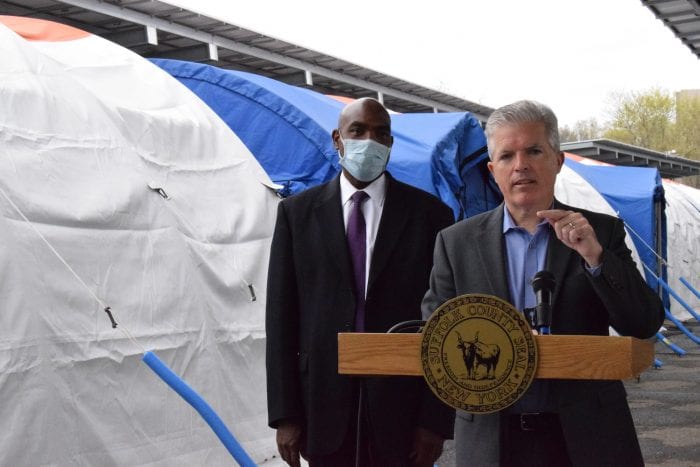County has favorable COVID-19 numbers despite some vaccine reluctance

Thanks to vaccines for COVID-19, the percentage of positive tests recently dropped below 1% for the first time since the third week of October.
“That’s a big deal,” said Dr. Gregson Pigott, commissioner for the Department of Health Services in Suffolk County.
Indeed, Adrian Popp, chair of Infection Control at Huntington Hospital/Northwell Health and associate professor of medicine at Hofstra School of Medicine, said the infection rate was closer to 10 percent in the middle of the winter.
The current positive tests represent a “really low number,” Popp said.
Infections are coming down even more than they did last year amid the economic shutdown because of the vaccine, Pigott said.
Pigott added that the vaccines have proven effective against the most predominant mutated form of the virus, B117 or the UK variant, which is also the most common mutation throughout the country.
“We haven’t seen evidence of resistance to the vaccine,” he said. “The vaccine is working against it.”
The number of people hospitalized with the virus also has been declining in recent weeks. Throughout the county, under 150 people were in the hospital battling symptoms of the disease that caused the pandemic. That’s down from a high of 863 on Jan. 19.
The age of those hospitalized is generally younger than the people who needed urgent medical care in 2020. They are in their 40s and 50s, and they generally don’t stay in the hospital for long.
Because they are younger and healthier, even if they are hospitalized, they generally are discharged sooner, Pigott said.
“I expect we’ll be under 100 soon,” Pigott said.
Indeed, area hospitals reported lower numbers of Covid patients. As of May 10, Stony Brook Hospital had 42 COVID-19 patients, with 13 in the Intensive Care Unit.
As of the same date, Huntington Hospital had 17 COVID-19 positive patients.
Vaccinations
The population of people who are older than 65 have generally embraced the opportunity to receive vaccinations. Pigott said about 80% of this population in Suffolk County have been vaccinated.
The elderly, who were among those representing the larger groups hospitalized or killed by the virus, were the first group eligible to receive the vaccination. Children as young as 12 are now eligible to receive a vaccine.
The medical community has been wondering how to “cross this barrier” to encourage more people to receive a vaccine that could continue to reduce the risk of the spread of the virus, Popp said.
Popp urged medical professionals to have conversations with each person to figure out why he or she might be reluctant. He attributed some of the fears of the vaccine to misinformation spread on the Internet or over social media.
Popp recognized that some of those who are unwilling to consider the vaccine don’t have a personal or regular connection with a member of a medical community they trust.
He suggested that doctors and nurses should visit people at cultural centers and schools.
Among workers at Huntington Hospital, the rate of vaccinations has slowed and is about 73%.
“We did quite well” to get to that point, but the hospital “can not go much further” without overcoming some resistance, Popp said.
Pigott said that the halt in the use of the Johnson & Johnson vaccine on April 13 tamped down on the vaccination rate.
When the Centers for Disease Control and Prevention and the Food and Drug Administration stopped the use of that vaccine pending an analysis of rare side effects, the county “never recovered momentum.”
Pigott said he has participated in webinars and has encouraged people to gather information to make informed decisions.
“The best you can do is show the numbers,” Pigott said, as the number of people who are over 65 who have been hospitalized has declined dramatically as a result of the use of the vaccine.
Reopening in stages
Employers throughout the county have been monitoring the health of their workers and keeping track of the vaccination rate.
Cold Spring Harbor Laboratory has been working its way through various phases of reopening, from phase 1, which occurred on June 1 and involved bringing back most of the scientists, to phase 2 in late September, with the return of more administrators, to phase 2A, which started May 3 and involved bringing back even more people.
The lab, which has historically hosted well-attended scientific meetings that bring together some of the best researchers from around the world, has not yet entered phase 3, when it would be open without any restrictions.
On any given day, the lab probably has 60 to 65% of its staff working on site, according to John Tuke, the chief pperating officer.
“We aspire to be 100% vaccinated, but we’re realistic to know that that’s probably not going to happen,” Tuke said. “Before we move into phase 3, we’re going to want to see that percentage be very high.”
The lab is hoping to bring some conferences back in the fall on a limited basis.
In the last week, the lab tested 400 people, with one test coming back positive. The highest the positivity rate ever got was around 1%.
The percentage of people who have received the vaccine at CSHL is in the low 80s.
While the lab has restrictions on travel, it has made exceptions for staff members to travel through requests to the director of research, the president of the lab or to Tuke.
BNL, meanwhile, continues to have about a third of its staff on site, while most of the staff continues to work remotely. Like CSHL, BNL is not requiring staff to be vaccinated.
BNL is not planning any in-person events this summer or fall. The lab has slightly expanded user access to facilities on a case-by-case basis. BNL has had 10 positive tests in the past month.
At Stony Brook University, about 82% of health care workers have been vaccinated, while 77% of students are vaccinated, with 16% looking to get it sooner rather than later, according to a spokeswoman. As with other SUNY and CUNY schools, Stony Brook will require a vaccine for everyone who returns to school in the fall.
Stony Brook is no longer requiring fully vaccinated people to wear a mask outdoors, except in crowded settings or venues.






